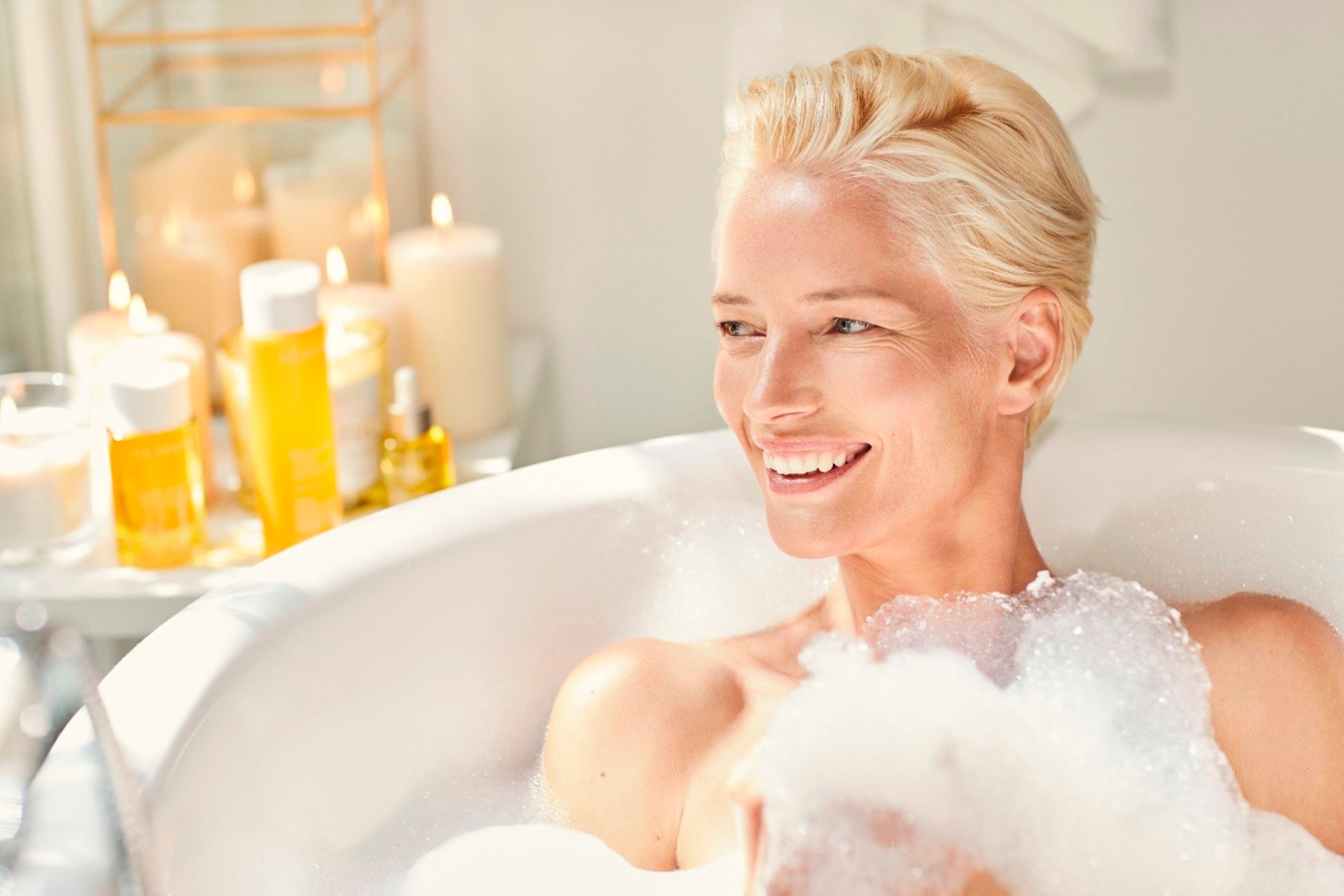
Water Quality vs Your Skin and Hair: Which State Has the Best Water Quality?
Skin and hair health can be influenced by various factors, ranging from UV rays, weather conditions, and pollution, to lifestyle choices like stress and dietary habits.
Whether it's for cleansing our face, showering, drinking, or laundry, the water quality from our taps can vary significantly based on our location. However, you might be unaware that various contaminants present in tap water could have adverse effects on the health of our skin and hair.
Using insights from data collected by the Environmental Working Group (EWG), United States Geological Survey (USGS), and Hydroflow - a water treatments enterprise - around water contaminants and hardness, Clarins has determined the water quality of capital cities across the states.
Clarins considered the levels of several contaminants and water hardness in its analysis, all of which can impact the skin. Additionally, the study also provides a broader comparison of water hardness levels among the states to pinpoint those that have the most detrimental impact on our skin health.
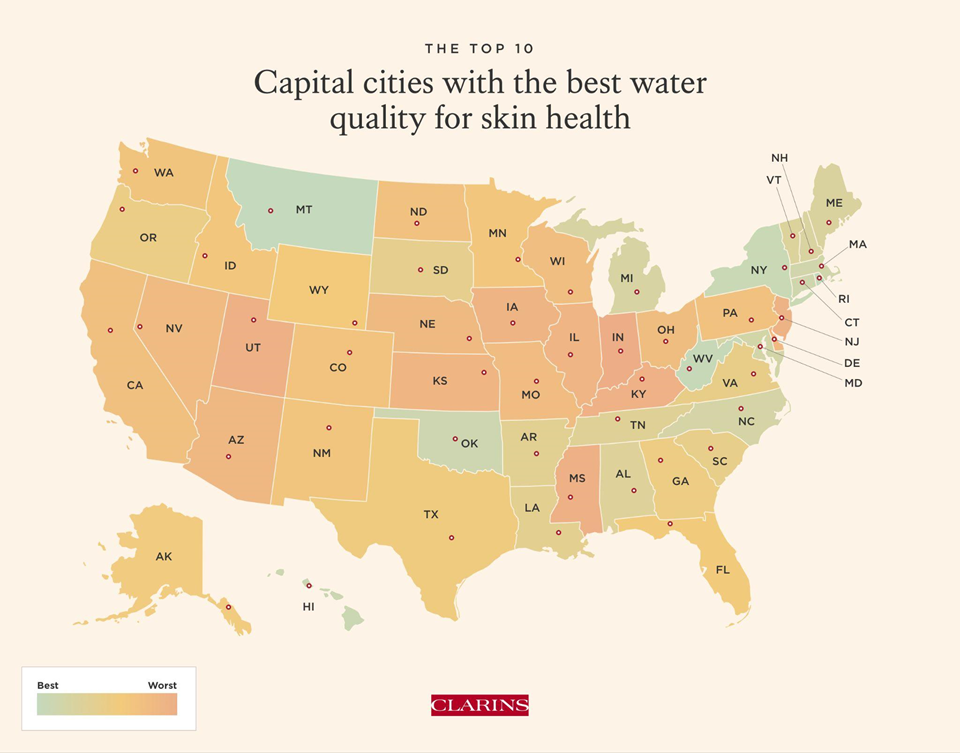
The capital cities with the best water quality for skin health
Through comprehensive analysis of existing data regarding contaminant levels in water across capital cities across the states, the team identified which state boasts the highest water quality. The lower the score, the better the water is for our skin.
The analysis primarily focused on contaminants such as arsenic, chlorate, nitrate, fluoride, lead, turbidity, and water hardness. These substances can negatively impact our skin, whether through facial cleansing or showering.
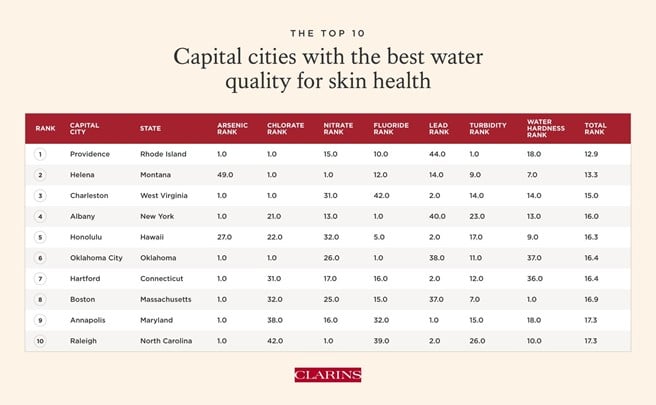
The analysis revealed that Providence, Rhode Island, boasts the highest quality water for skin health across the USA, with 12.9 points out of 50, the lowest score among all states. Despite showing high levels of lead and having moderately hard water according to Environmental Working Group (EWG) and Hydraflow’s database, Rhode Island ranked lowest for arsenic and chlorate levels both showing as 0. According to USGS, Rhode Island also ranked best for Turbidity levels indicating exceptional water clarity and quality.
With a score of 13.3 out of 50, Helena, Montana claimed second position. Despite relatively high arsenic levels, Helena’s water is seen as high quality for skin health, ranking notably low for chlorate, nitrate, and turbidity according to the EWG, USGS and Hydraflow.
Additionally, according to Hydraflow, Helena boasts the softest water across Montana, with a hardness level of just 25ppm, in contrast to the wider state's generally hard water, averaging 91ppm, indicating Montana as a whole has moderately hard water.
Charleston, West Virginia, secured the third position for the best quality of water for skin health. According to EWG’s database, Charleston exhibited notably low levels of arsenic, chlorate, nitrate, and lead, alongside only moderately hard water, indicating that the water quality is relatively favorable for skin health.
The capital city throughout the states with the worst water quality for skin health
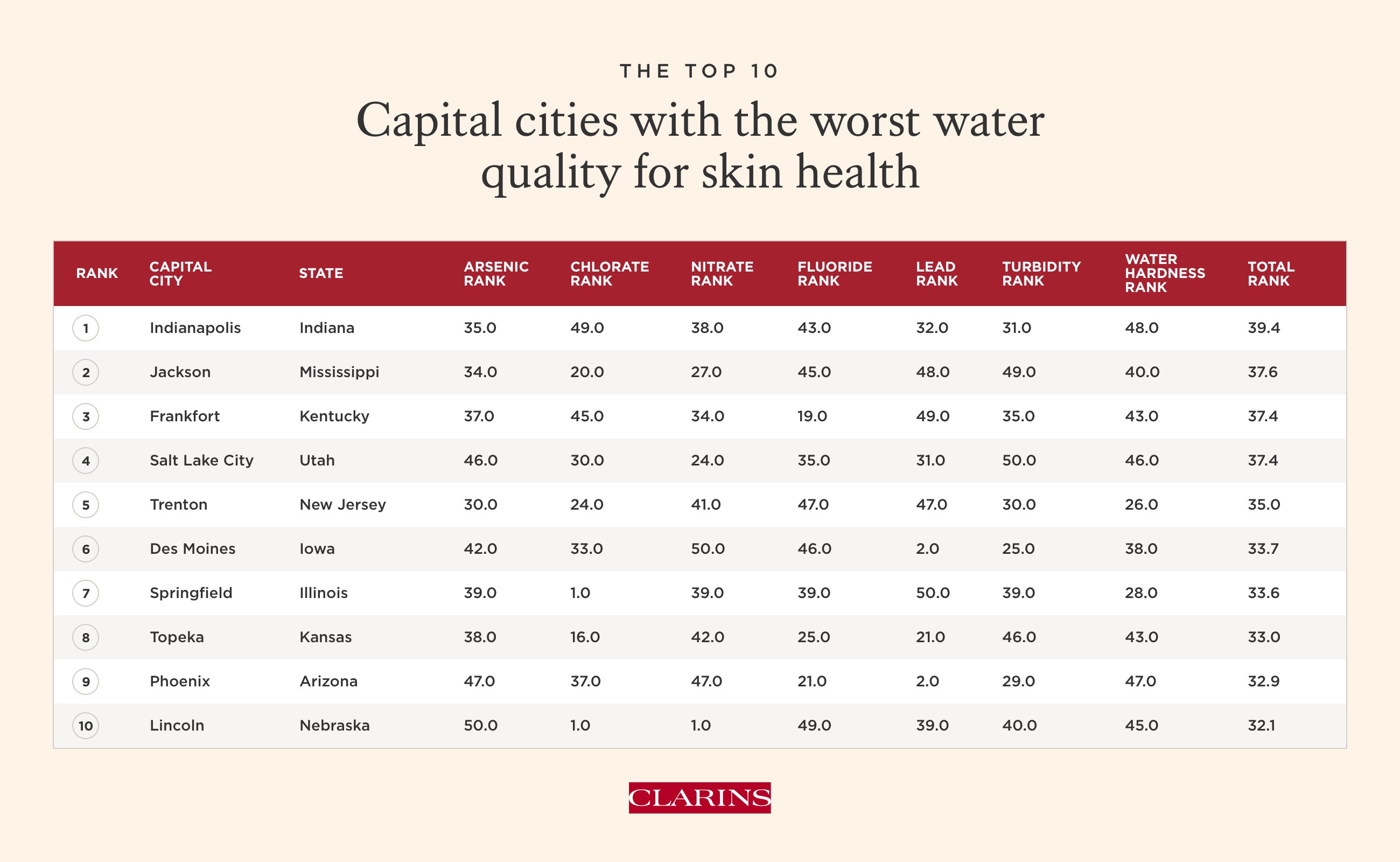
Leading the table with the poorest water quality for skin health is Indianapolis, the capital and most populous city of Indiana, scoring 39.4 out of 50. According to EWG’s database, the water quality in this capital city exhibited high levels of arsenic, chlorate, nitrate, fluoride, and turbidity, along with very hard water according to Hydraflow. The heavily contaminated and hard water utilized for skin cleansing in Indianapolis is more inclined to provoke skin issues such as dryness, itching, flakiness, and heightened occurrences of breakouts.
Jackson, Mississippi claimed the second spot for the poorest water quality for skin health, scoring 37.6 out of 50. According to the EWG database, the water in Jackson exhibited elevated levels of all contaminants, particularly fluoride and lead. Although slightly softer than Indianapolis, the water in Jackson is still considered hard stated by Hydraflow, which could have adverse effects on our skin with prolonged use.
Frankfort, Kentucky, secured the third position for the poorest quality water concerning our skin health. Despite marginally lower fluoride levels as stated by EWG compared to other contenders in the top 10, Frankfort exhibited elevated levels of other contaminants such as arsenic, chlorate, nitrate, lead, and turbidity. Furthermore, according to Hydraflows data, Frankfort's water is classified as very hard, representing the most adverse type of water for our skin health.
What is Arsenic’s impact on the skin?
Arsenic is a chemical element that is naturally found in the earth’s crust and can be released into groundwater under certain conditions. Given that groundwater serves as a crucial source of drinking water in many states, traces of arsenic may be present in tap water.
Long-term exposure to water with high levels of arsenic can cause havoc to our skin, this can include pigmentation changes and skin lesions such as blisters, rashes, and acne.
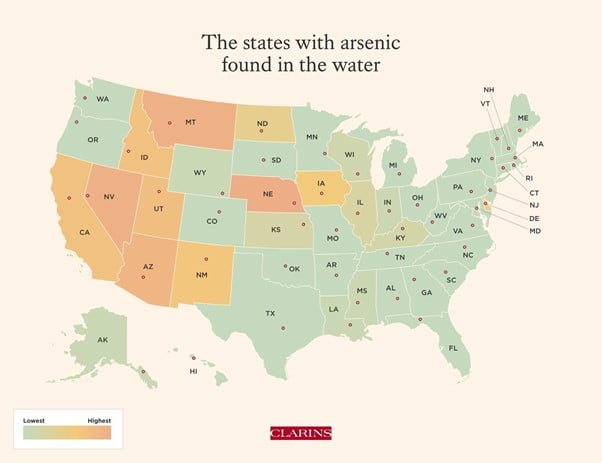
According to EWG’s database, just under half of the capital cities in the US states had detectable levels of arsenic in their water. Among these, Lincoln, Nebraska, recorded the highest levels of arsenic among all US capital cities (6.68ppb), followed by Helena, Montana (6.45ppb), and Carson City, Nevada (6.36ppb).
In terms of legal thresholds, all the analyzed results remained below the 10ppb limit imposed in the US. Nonetheless, Lincoln, Helena, and Carson City approached 50% of this limit.
Meanwhile, EWG’s data uncovered that among the 24 capital cities with detectable arsenic levels, Honolulu, Hawaii showcased the lowest concentrations, measuring just 0.02ppb. This amount represents a mere 0.2% of the legal limit. This stands in stark contrast to Lincoln, which had almost 66% of the legal limit.
| Rank | Capital City | State | Arsenic ppb |
|---|---|---|---|
| 1 | Lincoln | Nebraska | 6.68 |
| 2 | Helena | Montana | 6.45 |
| 3 | Carson City | Nevada | 6.36 |
| 4 | Phoenix | Arizona | 5.06 |
| 5 | Salt Lake City | Utah | 3.49 |
| 6 | Boise | Idaho | 2.88 |
| 7 | Sacramento | California | 2.8 |
| 8 | Santa Fe | New Mexico | 1.49 |
| 9 | Des Moines | Iowa | 1.11 |
| 10 | Dover | Delaware | 0.85 |
| 11 | Bismarck | North Dakota | 0.738 |
| 12 | Springfield | Illinois | 0.41 |
| 13 | Topeka | Kansas | 0.35 |
| 14 | Frankfort | Kentucky | 0.333 |
| 15 | Madison | Wisconsin | 0.254 |
| 16 | Indianapolis | Indiana | 0.163 |
| 17 | Jackson | Mississippi | 0.16 |
| 18 | Anchorage | Alaska | 0.15 |
| 19 | Baton Rouge | Louisiana | 0.141 |
| 20 | Cheyenne | Wyoming | 0.125 |
| 21 | Trenton | New Jersey | 0.0422 |
| 22 | Florida | Tallahassee | 0.0364 |
| 23 | Colorado | Denver | 0.0273 |
| 24 | Hawaii | Honolulu | 0.0224 |
What is Chlorate’s impact on the skin?
Chlorate is a by-product of the chlorination process used to disinfect water, and as a result, it can be found in varying concentrations in drinking water. Any chemical related to chlorine poses risks to our skin health.
Washing with water containing high levels of chlorate can strip away natural oils from the skin, potentially promoting premature aging. Furthermore, chlorinated water does not differentiate between beneficial and harmful bacteria, so washing your skin with chlorinated water may disrupt the natural skin flora, leading to skin conditions like acne. Prolonged exposure to this chemical can also result in skin irritations and itching.
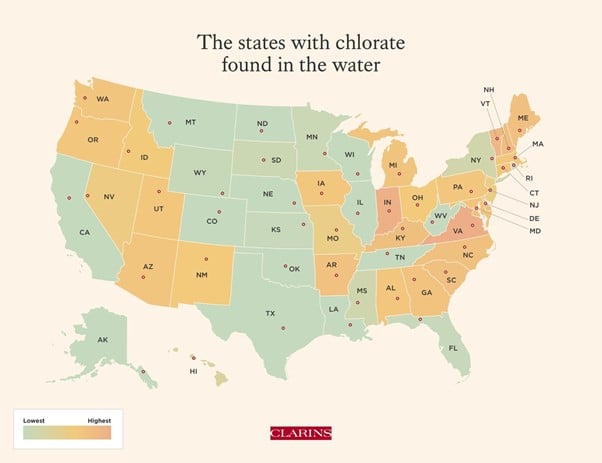
According to EWG’s database, Richmond, Virginia, exhibited the highest levels of Chlorate in its water among all US capital cities, measuring 533.1ppb. Following closely behind were Indianapolis, Indiana, with 492.9ppb, and Montpelier, Vermont, ranking third at 383.8ppb.
While there are no legal limits set for chlorate, the EWG’s health guidelines suggest that levels of 210 ppb or lower are considered safe. Surprisingly, all capital cities listed in the top 10 exceeded these health guidelines by a significant margin. Richmond, Virginia, for instance, surpassed the suggested health guideline by a staggering 254%.
In contrast, according to EWG’s database, 12 capital cities had zero levels of Chlorate present in their water supply. These cities included Helena, Charleston, Oklahoma City, Nashville, Baton Rouge, Austin, Juneau, Anchorage, Data, Denver, Bismarck, Lincoln, and Springfield.
| Rank | Capital City | State | Chlorate ppb |
|---|---|---|---|
| 1 | Richmond | Virginia | 533.1 |
| 2 | Indianapolis | Indiana | 492,9 |
| 3 | Montpelier | Vermont | 383.8 |
| 4 | Concord | New Hampshire | 280.4 |
| 5 | Dover | Delaware | 267.7 |
| 6 | Frankfort | Kentucky | 258.1 |
| 7 | Augusta | Maine | 247.7 |
| 8 | Columbia | South Carolina | 232.5 |
| 9 | Raleigh | North Carolina | 230.6 |
| 10 | Little Rock | Arkansas | 216.6 |
States with the hardest and softest water
Given the significant impact water hardness can have on our skin in both the short and long term, we aimed to compare water hardness levels across all states in addition to examining each capital city individually as stated by Hydroflow.
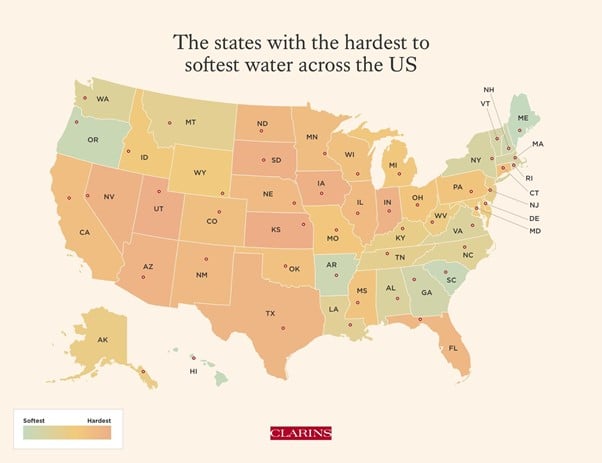
Hard Water vs. Soft Water: What's the Difference?
Water hardness is determined by the presence of trace minerals. In simple terms, hard water refers to water with a higher concentration of dissolved minerals, primarily calcium and magnesium ions, but also include several other metals, these include aluminum, barium, iron, strontium, zinc, and manganese.
You can identify hard water by the chalky residue it leaves behind on surfaces like your shower and sinks. Additionally, your glasses may not appear clean unless you use dishwasher detergents specifically formulated for hard water. You may also find that soap does not lather sufficiently when cleansing your skin.
On the flip side, soft water tends to have a lower level of calcium and magnesium than hard water but does have a higher concentration of sodium.
What are the effects of using hard water on the skin?
The abundance of essential minerals in hard water can significantly impact our skin and hair. Elevated levels of calcium and magnesium in hard water interact with the fatty acids found in soap and shampoo, forming coagulated chemicals. Consequently, thorough cleansing of the skin may not occur, and residual chemicals can leave a film behind. Over time, this residue can disrupt the skin barrier, resulting in both short-term and long-term effects.
Frequent exposure to hard water on your skin may lead to dry, flaky, and itchy skin, accompanied by more frequent breakouts. The residue left behind by hard water minerals can clog pores, intensifying skin issues. Prolonged exposure to hard water may even worsen skin conditions such as eczema and acne.
Additionally, the minerals present in hard water can generate free radicals, notorious for breaking down collagen, which maintains our skin's firmness. Prolonged exposure to hard water can accelerate premature aging, leading to sagging skin and the development of fine lines and wrinkles.
This phenomenon may also explain why you could experience more frequent breakouts or dry skin while traveling. Water hardness levels can vary across different locations, and even a basic shower can have an instantly noticeable effect.
According to Hydraflow’s database, 16 states had 'very hard water', while 10 were described as having 'hard' water, with the majority of the hard and very hard areas concentrated in the southern regions.
The States with the Hardest Water
| Rank | State | Average Water Hardness in PPMs (hydroflow) |
Water hardness level meaning |
|---|---|---|---|
| 1 | Kansas | 299 | Very Hard |
| 2 | Utah | 298 | Very Hard |
| 3 | South Dakota | 285 | Very Hard |
| 4 | Iowa | 283 | Very Hard |
| 5 | Indiana | 262 | Very Hard |
| 6 | Nevada | 261 | Very Hard |
| 7 | Arizona | 244 | Very Hard |
| 8 | Texas | 218 | Very Hard |
| 9 | Florida | 216 | Very Hard |
| 10 | North Dakota | 214 | Very Hard |
After analyzing the data, we found that Kansas has the hardest water among all states, posing the greatest challenge to our skin health, with an average water hardness of 299PPM. The water supply in Kansas primarily derives from underground wells abundant in minerals like calcium and magnesium, accounting for the exceptionally high water hardness levels.
Trailing closely behind Kansas, Utah emerged as the state with the second hardest water, averaging 298PPM. Despite Salt Lake City, the largest city and state capital, having the lowest water hardness, it is still classified as hard. This is attributed to Salt Lake City primarily sourcing its water from rivers and lakes in the surrounding mountains, where it inevitably accumulates minerals, resulting in elevated hardness levels as it flows down the canyons.
Ranked third for the hardest water in the US is South Dakota, boasting an average of 285PPM. South Dakota, known for iconic landmarks like Mount Rushmore, features vast prairies, fertile farmland, glacial lakes, and expansive ranchlands. The state primarily relies on surface water sources like the Missouri River and groundwater for its water supply.
The states with the softest water
| Rank | State | Average Water Hardness in PPMs (hydroflow) |
Water hardness level meaning |
|---|---|---|---|
| 1 | Maine | 12 | Soft |
| 2 | Hawaii | 21 | Soft |
| 3 | South Carolina | 25 | Soft |
| 4 | Oregon | 30 | Soft |
| 5 | Arkansas | 38 | Soft |
| 6 | New Hampshire | 39 | Soft |
| 7 | Rhode Island | 47 | Soft |
| 8 | Georgia | 48 | Soft |
| 9 | Vermont | 61 | Moderately hard |
| 10 | New York | 62 | Moderately hard |
Maine has the softest water among all states, boasting an average of 12PPM, making it the most favorable for your skin health. Consequently, most residential homes in Maine do not encounter scale-related issues and can be sure that the water used for cleansing does not lead to adverse effects. This northernmost state in the US, renowned for its pristine and serene waterways, exhibits a significant contrast compared to states with the hardest water, such as Kansas, with an average of 287PPM.
Famous for its exotic resorts and sandy beaches, Hawaii ranks second with an average water hardness of 21ppm. The Island of Hawaii boasts some of the highest quality drinking water available, with minimal treatment needed due to low levels of bacteria or contaminants. Hawaii primarily sources its water supply from surface water and aquifers. The water obtained from aquifers around the islands undergoes natural filtration by lava rocks, enhancing its quality.
Coming in closely behind Hawaii, South Carolina emerged as the state with the third softest water, averaging 25ppm. Residents of South Carolina primarily rely on wells, rivers, and lakes for their water supply, ensuring that the water remains notably fresh and is unlikely to have a significant negative impact on skin health.
Tips for looking at your skin if you have poor water quality
If you're experiencing irritated skin, it may be attributed to the water quality in your region. Continuous exposure to hard water during skin cleansing can result in dry, itchy skin that is more susceptible to breakouts.
Clarins skincare experts have offered several tips to combat the effects of hard water on your skin.
- Rehydration and re-balancing is key
- Moisturize, moisturize, moisturize
- Be gentle on your skin
- Avoid cleansing with thick, heavy soaps
- Use an anti-aging serum
Hard water, characterized by high levels of calcium, struggles to dissolve soap completely, often leaving residue on the skin. This residue can exacerbate sensitivity, irritation, and blemishes.
One effective method to restore hydration and rebalance your skin is by incorporating a toner into your skincare routine. Toning helps eliminate any remaining traces of cleanser, resulting in a fresher, smoother, and more hydrated skin feel.
In addition to disrupting the delicate skin barrier, hard water depletes the skin's moisture, leading to dry, flaky, and itchy skin with regular use. It's crucial to moisturize your skin after each cleanse and shower to seal in moisture. Applying moisturizer to your face and body while the skin is still damp interrupts the process of minerals from hard water settling on the skin, aiding in restoring the skin barrier.
Since hard water can exacerbate skin conditions like eczema and acne, it's essential to treat your skin gently. Instead of vigorously rubbing your face and body dry, opt for gentle blotting of the skin. Additionally, avoid using water that is too hot, as this can further dry and irritate your skin.
As previously mentioned, hard water struggles to dissolve soap completely, leaving residue on the skin after cleansing. If you already have skin issues, using basic soap can lead to significant irritation, exacerbating the problem. Instead, consider incorporating water-based cleansers into your hard water skincare routine. These cleansers do not leave behind the same residue as soap does with hard water and rinse away more easily, promoting healthier skin.
The minerals present in hard water can generate free radicals, notorious for breaking down collagen, crucial for maintaining skin firmness. Prolonged exposure to hard water may accelerate premature aging, leading to sagging skin and the development of fine lines and wrinkles. If you're concerned about the signs of aging, consider incorporating an anti-aging serum into your skincare regime. Clarins' iconic Double Serum is specifically formulated to address all visible signs of aging, visibly firming the skin, reducing wrinkles, and providing smoothness and hydration.
*Methodology & Data Sources
Data was taken from the most recent water quality reports for each capital city. For any zip code providing water to multiple counties, the utility serving the largest population was chosen to analyze.
The elements and contaminants selected for analysis were chosen based on their prevalence and their specific impact on skin health.
Water Hardness Source: https://www.hydroflow-usa.com/water-hardness-map
Contaminants Source: https://www.ewg.org/tapwater/
Water Turbidity Source: https://waterdata.usgs.gov/nwis/current?type=qw&PARAmeter_cds=STATION_NM,DATETIME,00076,63680,61028,63682,63684
Related Questions
How can I tighten my pores?
There are many factors that influence the size of your pores. Read on to discover what they are and how to shrink the appearance of pores.
READ MORE
How do I fight the signs of aging on my body?
Aging is inevitable but can you slow it down? We have the best anti aging skin care line to help you maintain your youthful glow. Find out more.
READ MORE
How to get glowing skin?
Depending on the season, your skin is exposed to harsh environmental influences like sun, cold, wind, pollution, heating, air-conditioning, or sudden temperature swings—aggressors that can leave it looking dry, dull and weathered…old before its time.
READ MORE
How often should I exfoliate?
Exfoliation forms an essential part of your beauty routine. Here’s how Clarins exfoliation products can make your skin more radiant.
READ MORE
How do I know if my skin is sensitive?
Sensitive skin can easily be thrown off balance – but read on to find out how to manage the condition starting with the right face wash for sensitive skin.
READ MORE
Why do I need a targeted eye cream?
Eyes are one of the most expressive parts of your body, but they’re also one of the most prone to aging. Here’s why under-eye creams are so essential.
READ MORE
How to protect your skin from stress aging
Learn how stress and heightened cortisol levels can visibly impact your skin. Clarins Experts provide skincare advice to help reduce the risks of aging from stressed skin.
READ MORE
What night skin care steps does Clarins recommend?
A Clarins' night cream is a wonderful treat no matter your skin type. Learn how to get visibly renewed skin and a radiant-looking complexion.
READ MORE
How do I take care of my mature skin?
Just because you have mature skin, doesn’t mean that it has to look it! Have a look at how Clarins’ anti aging products can help you reduce the risk of premature aging signs.
READ MORE
Can I use the same product both at night and during the day?
Day creams and night creams have completely different roles. Here’s how and why you should be using them both in your skin care routine.
READ MORE
Is it possible to visibly firm up my skin?
Skin starts to sag as we age, luckily there are a number of ways to get your smooth skin back. Clarins has the best firming lotions that are refreshingly addictive. Find out more.
READ MORE
What can I do for very dry skin?
Dry itchy skin is uncomfortable and unsightly. Read on to find out how the best skincare routine for dry skin can turn dry skin into visibly smooth skin.
READ MORE
What are the best ways to care for my hands?
Wondering how to keep your hands soft, supple, protected from the sun, and moisturized? We answer your most common questions about how to care for your hands.
READ MORE
What is the best way to moisturize my body?
If you think the only way to get smooth skin is with a photo editing app – read on to discover how body scrub, lotion, and moisturizer can unlock your best skin.
READ MORE

